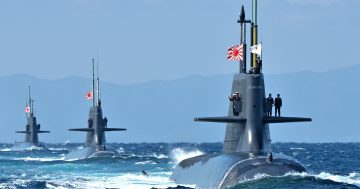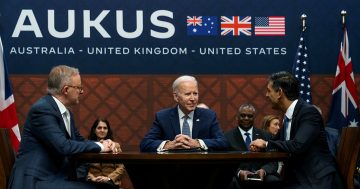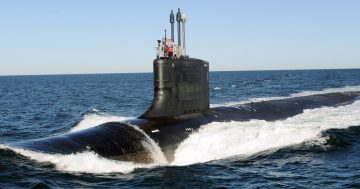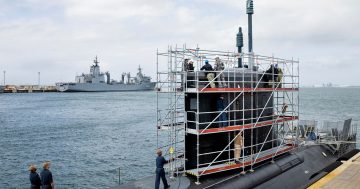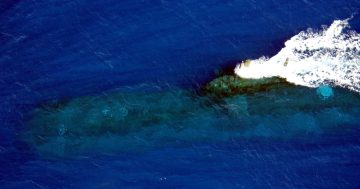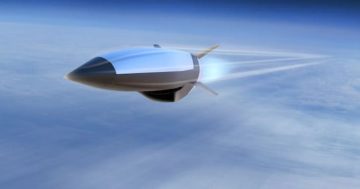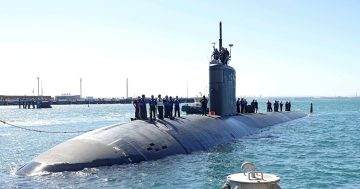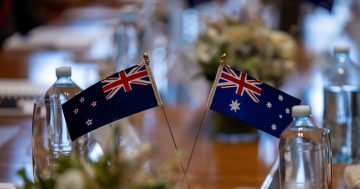
Australian Deputy Prime Minister and Minister for Defence Richard Marles, US Secretary of Defence Lloyd J Austin III, and UK Secretary of State for Defence Ben Wallace at the Pentagon in August 2022. Photo: ADF.
One of the major challenges Australia will have in acquiring nuclear propulsion technologies and other key elements from the US to fulfil its capability ambitions through the trilateral AUKUS construct will be getting approval for these systems through the US bureaucracy in a timely manner.
The US system has, until now, been necessary to prevent the proliferation of advanced military technologies through unauthorised sales to non-aligned countries. While some technologies still get through, either through third-party sales or espionage, the US’s International Traffic in Arms Regulations (ITAR) has been pretty effective in safeguarding sensitive technologies.
But nothing gets through the ITAR and Foreign Military Sales (FMS) processes fast, and with the threat in the Indo-Pacific region reportedly said to be imminent, a number of US Congressional members are introducing legislative bills that they hope will ease some of the US’s arms control laws when it comes to exports for Australia and the UK.
Republican Senate Foreign Relations ranking member Jim Risch and House Foreign Affairs chair Mike McCaul are leading the effort, and are colloquially-known as the ‘AUKUS caucus’. Senator Risch last week introduced the Truncating Onerous Regulations for Partners and Enhancing Deterrence Operations, or TORPEDO, Act.
“Unfortunately, the Biden administration’s implementation of AUKUS is not only failing to move at the speed of relevance given the China threat, but it is also evident both pillars of the agreement face major, structural challenges,” Mr Risch was reported as saying by POLITICO.
While Pillar I of AUKUS covered the transfer of nuclear propulsion technologies to Australia, Pillar II will focus on hypersonic and counter-hypersonic capabilities, artificial intelligence and autonomous systems, quantum technologies, cyber capabilities, undersea technologies, electronic warfare, and new innovation and information-sharing protocols.
Meanwhile, Representative McCaul called up officials from the US State Department and Department of Defense to testify to the House Foreign Affairs Committee on how to ease and increase the transfer of technologies to allies. This had been scheduled to occur on 10 May, but was postponed to an unspecified later date.
POLITICO reported that Mr McCaul also met with US defence companies in mid-April, all of whom reportedly agreed that ITARs were hindering their efforts to develop new capabilities for Australia.
In a 2 May statement, Mr McCaul said “I will continue to lead efforts to help ensure the successful implementation of AUKUS throughout this Congress.
“This trilateral partnership with our longstanding and deeply trusted allies, Australia and the UK, will play a vital role in deterring further aggression in the Indo-pacific,” he added. “To that end, I am pursuing bipartisan solutions to ensure the success of both Pillars I and II.”
The POLITICO report said AUKUS has bipartisan support from Republicans and Democrats in both the House and the Senate, although the Republicans have been focusing in on what they perceive to be a disconnect within the administration.
Democratic Senate Armed Services chair Jack Reed said he also supports changes to ITAR as a way to strengthen industry and speed up technology transfers, and may be open to related legislation in the annual National Defense Authorization Act.
“We have to get both [policy areas] into a position where we don’t compromise on security and the security of our weapons systems, but that we’re able to more efficiently and effectively deliver systems to our allies and to those who want to be our allies,” Senator Reed said in a 24 April speech.
Former US Deputy Chief of Mission and Chargé d’Affaires to Australia and current senior advisor at the Washington-based Center for Strategic and International Studies (CSIS) James Carouso has gone a step further, saying Australia needs to be made exempt from ITARs.
“The second pillar being cooperation on all sorts of advanced tech … if we are sharing information … I can’t get a bloody license or approval every time you want to exchange information,” he said in an InnovationAus podcast on 11 May. “But that’s what ITAR would require.”
He said the ITAR rules, which were implemented in 1976, are no longer fit for purpose in 2023, particularly in the context of the AUKUS agreement.
“We need to maintain a technological advantage,” he added. “To do that we have to work more closely with our closest allies, specifically Australia and the UK, on developing this advanced technology like hypersonics, quantum computing, drone technology.”
In a 17 May speech to the American Chamber of Commerce in Adelaide, Deputy Prime Minister and Defence Minister Richard Marles said export control regimes are a significant barrier that must be broken down. “Regulations around transfers of technology, sensitive information and defence materiel are, of course, understandable,” he said.
“But what is really clear is that if we are to realise the ambition of AUKUS, the transfer of technology and information between Australia and the US needs to be seamless. This is a big task – the barriers in both systems are vast and complex. There is no silver bullet.”
Original Article published by Andrew McLaughlin on Riotact.


